The ink is still fresh on The Fifth Estate, although perhaps that is too outdated a metaphor. The code is yet to be debugged might be more appropriate. History has yet to really decide what it will make of Julian Assange and Wikileaks. Cyber freedom fighters, the internet generation’s Woodward and Burnstein? Or reckless and disconnected kids failing to realise that writing on screen can have very real consequences? “Editing reflects bias,” we’re reminded early in the film, perhaps a concession that that the movie can’t get the necessary distance to offer a definitive (or even especially nuanced) take on Assange and his revolution.
The Fifth Estate comes down quite hard against Assange, essentially reducing Benedict Cumberbatch’s white-haired technological genius to something like a Bond villain. Director Bill Condon struggles to make typing code look sexy with laboured metaphors. And yet, despite that, there’s a willingness here to engage with something big and bold and important, however clumsily the script grapples with the implications of Wikileaks.
The result is something far more compelling that the dire Diana. Diana was a film so close to its subject that it couldn’t muster any enthusiasm or offer anything approaching a challenging opinion. The Fifth Estate is too close to its subject matter, and it clumsily stumbles into obvious bias and slant, but it’s still an intriguing attempt to parse a new media that it seems Hollywood doesn’t really understand.
To be fair to The Fifth Estate, there are a few clumsy nods towards balance. David Thewlis plays The Guardian journalist Nick Davies, and he’s quick to champion the virtues of the modern media age. He tries to convince fellow writer Ian Katz and editor Alan Rusbridger that the future of media lies out there on the internet. He embraces the digital age in a way that so few sympathetic film journalists seem to. Movies like Contagion decry the democratisation of journalism, pointing out that it is open to all manner of abuses, while ignoring that any form of journalism can be misused.
In what may be a sly dig at the other recent plucked-from-the-headlines awards bait, Davies is shocked at the amount of space that Rusbridger offers to Diana. The woman has been dead for years, he implies. The mainstream media is out of touch, and no longer held to account. He tours summits held around Europe to engage with the next generation of up-and-coming on-line journalists. He gets to know Assange, helping him slip away from surveillance and even introducing him at various summits and fundraisers.
The Fifth Estate teases the notion that maybe the information age might not be so bad. Maybe there’s a middle-ground to be found between old media and new. Of course, this isn’t insight or clever writing. It’s just suspense. Davies realises – as many on-screen journalists do before him – that these pesky kids with their laptops and their networks and their leaking information are really just reckless (that word gets used a lot) attention-hungry diva.
After championing the rise of democratic media, Davies inevitably realises that he has been wrong. Stupid guy, believing that anything that isn’t a massive and well-established newspaper could provide journalism. “He’s not a source,” Davies gasps of Assange, in a moment of realisation. Assange is the head of a massive media movement. “And we’ve given him a platform.” Thewlis delivers the line like the wool has been lifted from his eyes, like he’s just figured out a swerving plot twist.
When Rusbridger references Assange as Davies’ latest “messiah”, Davies concedes that he had “feet of clay. Like the rest of them.” The implication is that Davies has a central character flaw, that his trust in new media is a sign of weakness, a mistake he keeps making. There’s something very conservative and very cautious at the heart of The Fifth Estate. Assange is a polarising figure, but the nods towards even-handedness in The Fifth Estate seem almost superficial.
We’re left with the impression of a man who talks a good game. Assange is prone to temper tantrums, he’s volatile, troubled. We know this archetype. Apparently it’s the kind of genius that works in information technology. Cumberbatch does great work with the material provided, but The Fifth Estate‘s version of Julian Assange feels like a grossly simplified version of The Social Network‘s Mark Zuckerberg. He’s arrogant, controlling, manipulative, untrustworthy. He can rationalise and justify all he wants, but he doesn’t recognise that his actions – even conducted through computers, have grave consequences.
The Fifth Estate seems a little awkward around computers, as if it’s not entirely sure if its viewers know what a computer is, or what you do with one. Everything is explained with a clumsy visual metaphor, as if Assange has built Wikileaks as some strange hybrid between Tron and Microsoft’s ill-fate Bob. When it’s revealed that Assange is using dummy acounts, we see row after row of Assanges sitting at little office desks. When the system comes down, we’re treated to slow motion footage of our characters tearing up an office. The movie seems to have little regard for the audience – when good stuff happens, green code scrolls across Assange’s screen; when things are bad, it’s red.
To be fair, I’m not sure if this is down to some worry that the audience won’t understand what is going on otherwise, or simply an attempt by Condon to make computers look dynamic. The Fifth Estate models itself on an espionage thriller, but that’s tough when most of the cast don’t do much outside of computers. There are a lot of shots of people dynamically grabbing laptops, or smacking keyboards, or grunting or screaming in physical assertion as they type.
Then again, The Fifth Estate seems as if it’s aimed at people who are afraid of computers. As much as I like Alexander Siddig, and I like Alexander Siddig, we’re treated to a pointless subplot about one US informant whose life is ruined by Wikileaks. It is only tangentially related to the plot, aside from an obvious desire to give the conflict a human dimension. But why this side of the argument? Why don’t we follow the victim of one of those assaults or incidents in Iraq or Afghanistan? Why don’t we get some balance?
The only real world consequences we see from Wikileaks are negative. Assange boasts about swinging the vote ten percent in Kenya, but his work gets two colleagues murdered. The only on-the-ground character we follow has his life up-ended by Assange’s desire to publish. We’re invited to share a sob story with a State Department official who spent years at college afraid that she might say the wrong thing, staring at Assange as the self-made prophet.
The Fifth Estate doesn’t pick a side – that would imply that it acknowledges the other side. Its portrayal of Assange isn’t nuanced or provocative, it’s outright villainous. The most sympathetic reading of The Fifth Estate explores Assange’s personal history, as if to imply that he can’t really be blamed for his actions. That’s not a particularly balanced film. It’s clumsy, and manipulative, and more than a little bit awkward. Since it’s hard to divorce your politics entirely from the film – and The Fifth Estate will inevitably be viewed through the audience’s political prism – I’ll confess that I have a lot of problems with Assange’s practices and behaviour. At the same time, The Fifth Estate is just clumsy.
And yet, despite that, I don’t entirely hate it. The Fifth Estate is a mess. It’s a film that needed a lot more work before it was filmed. However, it has the courage of its own convictions. There’s never a sense that the movie is playing it safe or hedging its bets. As if acknowledging that we’re all too close to Assange to even feign objectivity, the film picks one side of the debate and runs with it whole-heartedly. There’s an energy and an enthusiasm here that feels sincere – a genuine attempt to tackle “big” ideas, even if it isn’t up to the task.
It’s easy to imagine a mealy-mouthed middle-of-the-road Wikileaks films trying to appeal to both sides of the debate, compromising itself completely in order to affect the pretence of balance. One of the many reasons Diana was terrible was because it was too afraid of history and public opinion to say anything of worth about its subject. The Fifth Estate will provoke a lot of ire, a lot of it earned, but there’s an endearing and giddy thrill to all this – a sense that it’s trying to scrawl some ideas in wet cement. They don’t have to be works of art to make an impression.
Filed under: Non-Review Reviews | Tagged: Bill Condon, contemporary, film, Julian Assange, Movies, non-review review, review, the fifth estate, thriller politics, Wikileaks |















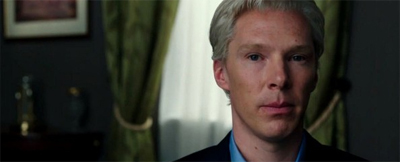

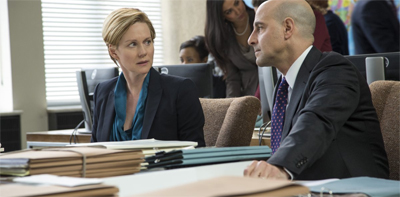
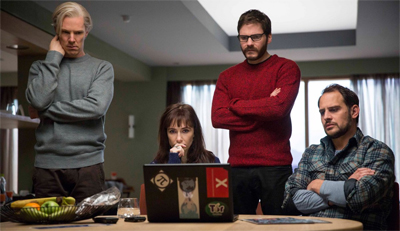
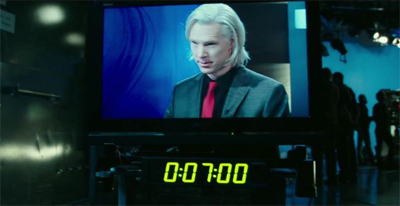
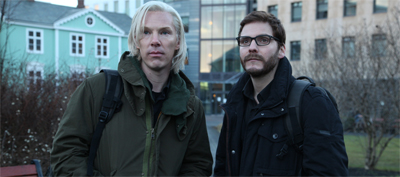
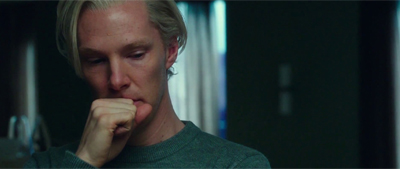





Condon is such an over rated shitty director, but definitely splashy. He used Rob Pattinson’s face in Water For Elephants as face porn, his Breaking Dawns 1,2 were more soft porn, to the point of utter boredom and embarrassed laughter in the audience I attended with, but seems to be very much liked in H’wood. I suspect he is just a good of boy there. Too bad as Bruce Sterling at medium.com gave Assange the credit for saving Snowden’s ass when all the countries and countless thousands of human rights organizations sat with their butt plugs in place.
From a studio perspective, Condon is (or, until this opened, was) reliable, I think. He’s a director who will get your film made on time and won’t stand in the way of any Oscar nominations it could earn, while still maintaining popular appeal. He won’t dominate your production, but will get it done. Although he’d be far from my first choice for a film like this. (Then again, the script would be far from my first choice for a film like this.)
Yes you are correct as you most often are. Why I read you all the time.
Another good good review! And again I agree, especially on the office metaphor. Rancid, that.
So much of the film is built around the idea that people are idiots. Which is frustrating, because it’s a great true story.